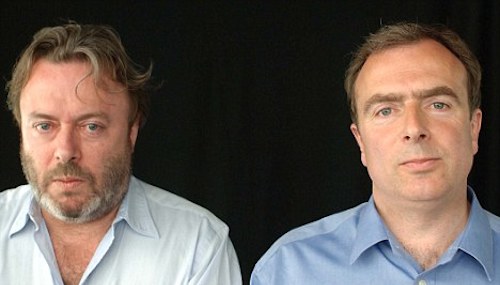I was looking for essays about Flashman yesterday and ran across this appreciation by Peter Hitchens, self-described Burkean conservative and brother of Christopher Hitchens. Burkean conservatism was last seen railing against the French revolution, but it’s not Hitchens’s archaic politics that irritate me. It’s his overblown prose. Here he is on the Flashman books:
I’ve re-read many of them since, but one by one, on various long journeys where I knew for certain they’d keep me from tedium as the plane ground slowly through the night.
The reader will be shocked to learn that Hitchens reads books one at a time. And what’s the perfect verb for how a plane flew? Oh yeah: ground.
As a Burkean, Hitchens looks to institutions for their edifying and stabilizing effect on society. That includes not only such formal institutions as the Church of England, but also abstract institutions like marriage. In the same 2005 article where he is infamously called “the Mail on Sunday’s fulminator-in-chief,” Hitchens explains the problem of single motherhood:
When you abolish husbands and fathers that is what you get. As the rules of civilized life are swept away and the only people interested in getting married are lesbian clergywomen, there will soon be thousands of them.
This passage, with its confusing “them” at the end, nicely captures what infuriates me about Hitchens. It’s not his high dudgeon at other people’s suffering so much as his tendency to work himself into a righteous frenzy and then commit some rhetorical blunder.
Hidden within this fumbling stab at wit is a stupid idea. Has the “abolition” of the male side of marriage really multiplied the number of lesbian clergywomen? One suspects that Hitchens loves established institutions and social mores because he has to think about them that much less.
I reject the argument that a bad writer is necessarily a bad thinker; pretty much the whole field of philosophy refutes that. But Hitchens’s tendency to run aground just as his sails fill suggests that he is more interested in the feel of words than what they, you know, mean. It’s the plane that grinds through the night: it feels that way to him, even if, when you read it back, it does not say much.
The limitations to Hitchens’s thinking manifest themselves in another way in this quote from the Guardian article, in which he addresses his reputation as a kook:
I know a lot of people consider me to be disreputable or foaming at the mouth, but you have to learn not to care, or at least not to mind. I don’t like being called ‘bonkers’ and I think to some extent it demeans people who use phrases like that. But I take comfort from the fact that most totalitarian regimes tend to classify their opponents as mentally disordered.
He was so close to the high road, and then he veered off into that sentence at the end. That kind of deployment of a logical fallacy for rhetorical effect is what separates the ethicists from the demagogues, the thinkers from the personalities. A responsible writer foreswears those kinds of dirty tricks, unless he is absolutely convinced that he is right.
Corollary: no responsible writer is that convinced he is right. The more you read about him, the more the flaws in Hitchens’s sentence-level writing seem to be a symptom of his moral arrogance. Consider that he and his brother did not speak to each other for four years, ostensibly over a joke about Stalinism but also because Peter characterized Christopher as a communist sympathizer shortly after September 11.
The absolutism of both Hitchens’ views is striking in that interview, not least when Christopher says, of Peter’s faith, “I can’t stand anyone who believes in God, who invokes the divinity or who is a person of faith. I mean, that to me is horrible repulsive thing.”
My brother and I disagree about religion, but I would never describe his views as “repulsive” or say that I can’t stand people who think the way he does. Then again, I cannot imagine going four years without speaking to him. No matter how right I thought I was, I would not sacrifice so much love for principle.
That’s what’s repellent about Peter Hitchens. He is so fervent is his beliefs that he is willing to ignore brotherly love—both literal and figurative, as when he insists that drug addiction is a made-up excuse—and so clumsy in expressing them that you get the feeling he hasn’t thought them out. He argues not with the authority of reason but of morality, yet he is arguing for morality itself. His ideas are what you get when you start with the presumption that you are right and work outward from there, searching for people who are wrong.





Well contemned. What’s with the Matthew Perry tag though?
If you click on the drug addiction link in the last paragraph, you will find an expression of his strange beef with Matthew Perry re: being drug-addled, famous.